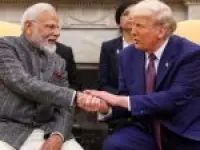
West Bengal Chief Minister Mamata Banerjee firmly reiterated her opposition to the Citizenship Amendment Act (CAA) on Wednesday, stressing it’s linked with the National Register of Citizens (NRC). She expressed concerns over the potential establishment of detention camps in Bengal like “those in Assam” and labeled the CAA as a mere “political gimmick” ahead of the Lok Sabha polls.
The Centre on Monday notified The Citizenship (Amendment) Act, implementing the law across the country under which non-Muslim migrants from Bangladesh, Pakistan and Afghanistan fleeing religious persecution can seek Indian citizenship. Persons from Hindu, Sikh, Buddhist, Jain, Parsi or Christian communities from these countries, who entered India on or before December 31, 2014, can seek citizenship under the law.
Opposition parties, including the Congress, have criticised the timing of the Act”s implementation. Despite previous assurances from Union Home Minister Amit Shah that a nationwide NRC wasn”t imminent, Banerjee vehemently opposed the idea of citizenship being granted based on religious criteria and declared her intent to prevent the enforcement of the law in her state.
The Trinamool chief described the new law as yet “another ploy to sow division in Bengal.” She asserted, “We will not stand for this. We are all citizens.”
In Siliguri, Banerjee underscored the link between the CAA and NRC and said, “CAA is to NRC, that is why we are opposing it. We don”t want detention camps like those in Assam.”
As a vocal critic of both the Centre and the CAA, Banerjee warned that the CAA will subject people to harassment and jeopardize their fundamental rights. She highlighted the intrusive nature of the Act, questioning the requirement for paternal birth certificates and expressing skepticism about its legality.
Banerjee warned of a systematic erosion of citizenship rights and urged citizens to carefully consider the implications before embracing the Act.
“They are asking for your father’s birth certificate. Do you have your father’s birth certificate? I don’t have one. I don’t even know my parents’ birthdates. Those who are jumping with joy, read the Act and see how dangerous it is. You will be marked a refugee, then your property, your house, your basic rights will be taken away, few will get citizenship but the remaining will be sent to a detention camp,” she claimed.
Legal experts caution that individuals whose applications for Citizenship Amendment Act (CAA) benefits are denied may face detention, as India lacks deportation treaties with Pakistan, Afghanistan, or Bangladesh.
Citizenship in India can be acquired through birthright, if one parent is Indian, or through naturalization. Eligibility for citizenship under the CAA extends to individuals who arrived in India on or before 2014. Consequently, the additional two years stipulated in the Act hold little significance, rendering it more of an electoral strategy.
While the BJP views the implementation of the CAA as a significant electoral advantage, particularly in Bengal, for the Trinamool, the law presents a formidable electoral hurdle. The implementation of the CAA had long been a fervent demand of the Matuas, a Hindu scheduled caste group originating from present-day Bangladesh. Many members of this community migrated to Bengal post-Partition or following the formation of Bangladesh. Given their political significance, both the BJP and Trinamool have aggressively courted the Matuas in the run-up to state and national elections. The BJP, in particular, sees the CAA as a potential game-changer in its favor.
However, a segment of the community aligned with the Trinamool remains skeptical. Mamatabala Thakur, a former MP from the party, said the Centre”s announcement is aimed at getting votes. “What about the citizenship rights already granted to Matuas after 1947? Will the CAA force them to come up with identity proofs once again and throw them into an uncertain future?” she asked.
In an apparent reference to constituencies dominated by the Matua community, Banerjee questioned the BJP”s motives “Is all of this just to secure 1 or 2 seats?” She cautioned the Matua community against placing their trust in the BJP, portraying the CAA as a mere tactic to harass people and garner votes.
“Will you hand over your future to the BJP for an election? This is to harass people and win seats. My Matua brothers and sisters, do you believe in this? Will you be able to vote? Don”t walk this path. BJP will say many things, but it is a lie and a jumla,” she said.













